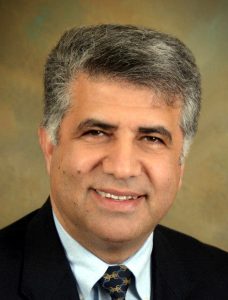By Dr. Omar M. Lattouf
Special to Campus News
Special to Campus News
One in 10 Americans lives with type 2 diabetes. Among many communities, diabetes is downplayed as “having a little sugar” and, with long family histories with the disease, dismissed as an inevitability.
The disease is far more dangerous than most realize. Diabetes doesn’t merely put patients at risk of shock, limb amputation, and obesity. Patients with diabetes are up to four times more likely to die of heart disease, the leading cause of death in the United States, than their non-diabetic peers.
Many people who have had diabetes for years unfortunately learn of the risks of heart disease and stroke only after having an attack. We must do more to raise patients’ awareness of the connection between these deadly ailments and empower them to lessen their risks. Right now, two in three people with diabetes don’t realize that heart disease is their most probable cause of death.
If more people knew about the risks, they could take preventative action. Ninety-nine percent of individuals with diabetes report that such knowledge would lead them to seek remedies.
Type 2 diabetes prevents the body from efficiently producing insulin, a hormone that regulates the amount of sugar in the blood. As a result, patients’ blood sugar levels can swing wildly.
Elevated blood sugar levels damage blood vessels over time, stiffening them and degrading the elasticity necessary for efficient circulation. That’s a deadly recipe for heart attacks.
Further, African Americans, Hispanics, and American Indians have a 50 to 100 percent higher burden of illness and death from diabetes than white Americans. This higher diabetes rate could help explain why these populations are notably more likely to die of heart disease.
Many people with diabetes aren’t doing enough to prevent heart disease. About half of adults with diabetes do not meet recommended blood sugar, blood pressure, or LDL cholesterol levels. Given the knowledge and tools we have to address these risk factors, the cardiovascular toll of diabetes should be decreasing. Instead it’s on the rise.
Part of the challenge is that even physicians aren’t fully informed about the connection between diabetes and heart disease. There are “educational gaps in physicians’ knowledge” of diabetes which prevent them from making informed treatment recommendations to patients. While focusing on controlling glucose levels in the blood is important, that alone may not protect people with diabetes from heart disease.
A good start is more closely monitoring and managing patients’ blood fats, including cholesterol levels. Studies show that patients with high LDL cholesterol levels are more likely to develop heart disease. Doctors can recommend these patients change their diets, increase their physical activity or prescribe cholesterol-lowering drugs.
Physicians should also closely monitor patients for high blood pressure. Hypertensive diabetics are twice as likely to develop heart disease compared to those without high blood pressure.
Doctors cannot stand by as heart disease and diabetes ravage our country. By better understanding the link between these conditions — and educating patients about that connection — physicians can play a leading role in combatting these costly, coexisting, and chronic conditions.
 Omar M. Lattouf, MD, PhD, is a Professor of Cardiothoracic Surgery, Emory University School of Medicine.
Omar M. Lattouf, MD, PhD, is a Professor of Cardiothoracic Surgery, Emory University School of Medicine.






Facebook Comments